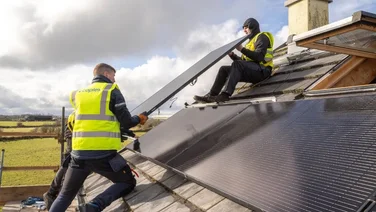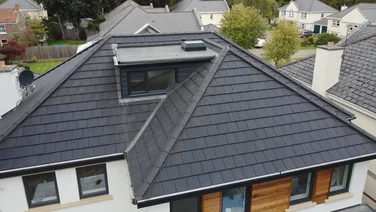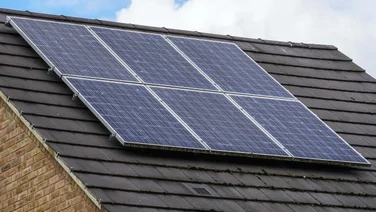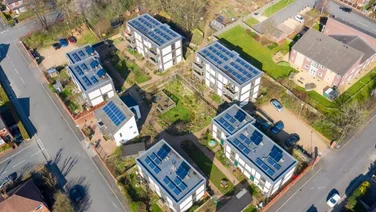- What are marine solar panels?
- How much do marine solar panels cost?
- How many marine solar panels do you need for your boat?
- Types of marine solar panels
- What are the benefits of marine solar panels?
- How long do marine solar panels take to install?
- Marine solar regulators
- Are marine solar panels worth it?
- Summary
✔ Marine solar panels power your boat’s battery using sunlight
✔ A 30-watt solar panel typically costs £70
✔ You’ll need roughly 100 watts for every 10 feet of boat
There are many different kinds of solar panel, and marine solar panels can give you more freedom to explore without having to refuel.
You can even use solar energy to power the engines of some boats, letting you cruise the high seas indefinitely.
If you’d like to start finding quotes for a solar panel system, you can always fill in our simple form. Just enter a few details and our trusted suppliers will get back to you.
Where do you want to install solar panels?
Get started
What are marine solar panels?
Marine solar panels are designed to work specifically with boats, so you can power everything on board without having to return to shore or run a polluting generator.
They function just like ordinary solar panels you’d find on the roof of a house, converting sunlight into usable, clean electricity.
The main difference between marine and ordinary solar panels is that marine models are waterproof, and specifically built to withstand the harsh conditions of the sea.
At a time when ocean acidification is wreaking havoc on marine ecosystems, switching to solar is a great idea if you can afford it, because it’ll reduce your carbon emissions.
What are marine solar panels used for?
Marine solar panels are used to keep your boat’s battery charged, using clean solar energy. Where you’d normally have to burn fuel to keep the power on, marine solar panels eliminate this need entirely.
If you have a yacht, you can stay out at sea for longer using your marine solar panels to provide all the electricity you need.
You can also run your boat’s engine on solar panels, but this is generally only feasible for smaller models. Larger boats often require more power than solar panels can generate, at least for now.
Because of this, most people get marine solar panels solely to power their appliances. However, there are some boats that combine an electric engine with solar panels and a petrol/diesel-powered generator to keep it charged.
Where do you want to install solar panels?
Get started
How much do marine solar panels cost?
Prices start at £70 for the smallest panels, which are typically 30 watts.
You can expect to pay several hundred pounds for panels that are 100 watts and over, meaning if you live on your boat and use a lot of electricity, you’ll be looking at paying between £500 and £1,000, depending on how many panels you need.
With some manufacturers, prices will include everything else you need, including the cables and regulator — otherwise, you’ll have to buy them separately.
You’ll also need to decide whether you want to fit the panels yourself — which you can do — but we recommend getting a qualified installer to do it for you.
You’ll be looking at £600 upwards for the supply and installation of a 200-watt system, and £1,050 for a 400-watt system, plus the solar controller on top.
If you live on your boat or use it a lot, you should recoup your costs within around a year.
Want to learn more about the price of solar panels? Head to our solar panel costs page for more information.
How many marine solar panels do you need for your boat?
The general rule of thumb is 100 watts for every 10 feet of boat, but this will differ depending on how much power you expect to use.
This handy table will give you a rough idea of how much power common boat appliances consume:
Overall, that’s 249 watts an hour, or 3,592 watts over a day, so in this case, you’d need a 400-watt system to keep it all running smoothly.
Types of marine solar panels
Flexible marine solar panels
Flexible marine solar panels are perfectly suited for fitting around the contours of a boat, which means they take up less space than a mounted system.
You also have plenty of freedom over where you put the panels, especially as some models are durable enough that you can walk over them, as long as they have a non-slip coating.
They’re very similar to thin-film solar panels, which can be used on boats too.
The main downside to flexible solar panels is their lower efficiency rating, compared to standard solar panels — 7–13% compared to the 18–22% offered by modern, monocrystalline solar panels.
So you’d need to cover a larger surface area with flexible panels to get the same power output as you would with the non-flexible variety.
Flexible marine solar panels also cost more than rigid panels of equivalent power, but tend to work better in low light and shade, as well as at higher temperatures.
Flexible solar panels are also portable, since they are so light. You can find out about the different types of portable solar panels, used for boat and camping trips, by visiting our guide.
Rigid marine solar panels
Rigid marine solar panels are fixed to a frame and mounted on your boat. They’re bulkier but more efficient than flexible marine solar panels.
They have a thick, toughened glass covering for more durability, and are typically encased in an aluminium frame. Like the flexible variety, rigid marine solar panels are engineered to endure what the ocean throws at them.
You’ll get better value for money with rigid solar panels, because you can get more power out of less space.
You might still find that you use more space overall though, as mounted systems have fewer surfaces they can be installed on.
What are the benefits of marine solar panels?
- You’ll pay nothing for your electricity: sunlight is free, so once you’ve paid for and installed the panels, they’ll cost nothing to run.
- They’re easy to use: all types of solar panels work automatically in daylight, so you can sit back and let them generate clean electricity without having to do a thing.
- They’re silent: without solar or wind power, many boat owners rely on running the engine to charge their batteries, which is noisy, costly, and can make the cabin uncomfortably hot if you’re already somewhere warm.
- They’re environmentally friendly: solar panels produce no pollution, don’t contribute to global warming, and don’t use up natural resources.
- No flat batteries: your solar panels will charge the battery while you’re away from the boat – so it’s ready to roll when you are.
- Maintenance is minimal: all you need to do is wipe the panels with a damp cloth and some mild detergent to remove dirt and salt, and check the equipment now and again for wear and tear.
- Solar panels last a long time: you can expect your solar panels to be with you for at least 25 years. It’s not uncommon for them to function just fine after this point too; they’ll just be a little less efficient.
- Your engine will thank you: using solar panels means less wear and tear on your engine, and consequently less maintenance.
- Your battery will thank you too: letting your battery go flat can damage it and shorten its life.
How long do marine solar panels take to install?
Installing either flexible or rigid marine solar panels will typically take a day, but could take as many as three depending on the complexity of your setup.
Getting a qualified professional to install your solar panels will reduce the time it takes, even if you’re confident installing them yourself.
Marine solar regulators
A solar regulator, also called a solar controller or charge controller, has two functions: preventing your battery from overcharging (which can damage it), and stopping power from flowing back out of the battery when it’s not needed.
The two types of solar regulator are pulse width modulation (PWM) and maximum power point tracking (MPPT) regulators. PWM regulators are simpler and less expensive, but MPPT regulators are more efficient, and so will deliver more power.
A regulator will use some of the power produced by the panels, but most manufacturers recommend one for all but the tiniest wattages.
The regulator should be installed somewhere that’s cool, dry, well ventilated, easily accessible, and as close to the battery as possible.
If you don’t have a regulator, you’ll need a blocking diode to stop power coming back out of the battery at night.
Prices for a regulator start from £20 to £30 and go up to more than £100. It’s helpful to buy a regulator which has a digital display, so you can see data on how much power the panels are producing, and how charged the battery is.
Are marine solar panels worth it?
Yes, because you’ll increase both the time you can spend out at sea, and the lifespan of your boat’s battery, which will save you money because you won’t have to replace its battery as soon.
If your boat is capable of running entirely on solar power, you’ll spend absolutely nothing on fuel. With rising fuel costs, this could save you hundreds, if not thousands of pounds every year, especially if you use your boat frequently.
Summary
Marine solar panels are a perfect addition to any boat using electrical items, whether or not you plan to run the engine on petrol. If you can run your boat’s engine using solar panels, then it’s even better.
They’ll save you money on fuel costs, keep your battery healthier for longer, and reduce your carbon emissions — an essential part of slowing ocean acidification.
If you’re ready to find out what solar panels could cost you, fill in our simple form. After entering a few details, we’ll put you in touch with our trusted suppliers. They’ll get back to you with bespoke solar panel quotes for you to compare.





